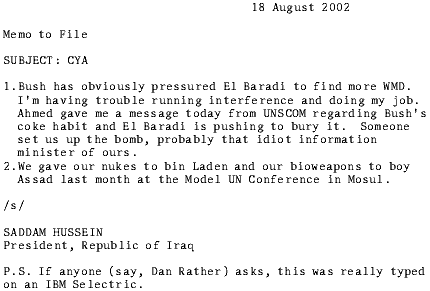Commerical Appeal writer Bartholomew Sullivan does his best to put meat on the bones of claims that Republicans are planning an active campaign to “disenfranchise” black voters, but fails miserably, beginning with the subhead of his piece:
Paranoia strikes deep among black voters
“Paranoia” is defined as “a psychological disorder characterized by delusions of persecution or grandeur.” In other words, the Commercial Appeal is essentially accusing black voters of being collectively insane. But never fear: the CA is on the case to, er, ease those fears, perhaps. Sullivan goes on:
Although Bush-Cheney campaign officials say the perception is baseless and that efforts are under way to further diversify the GOP, the strictly nonpartisan vote-protection effort is aimed at thwarting tactics that are perceived to benefit Republicans by targeting black voters likely to vote for the Democratic ticket. [emphasis added]
Strictly nonpartisan? Of course, it’s led by the ACLU and NAACP, two groups known for their wide, bipartisan membership.
Mississippi, “for obvious historical reasons,” will have teams of poll watchers on the ground as one of 14 “Priority 1” states, said Lawyers Committee for Civil Rights Under Law public policy counsel Kim Alton. Arkansas and Missouri are also “Priority 1” concerns.
In other states, including lower-priority Tennessee, the coalition is asking people with voting concerns to report them at (866) OUR-VOTE – (866) 687–8683.
Nothing like “obvious historical reasons” to want to oversee a vote, though one would suspect that Tennessee might also have some of those “obvious historical reasons,” being a state that had Jim Crow and all.
[The efforts of these groups are] all in response to the perception that not-so-subtle efforts – and at least one overt plan – are under way to keep black voters, who traditionally vote overwhelmingly for Democratic candidates, from having their preferences counted.
After that passage, one wonders if the purpose of this effort is to dispel or foment paranoia. Sullivan does go out of his way to quote a few moderately sensible figures, but manages to close with this quotation:
Asked about any such [voter intimidation] efforts in the Mid-South, Eliott M. Mincberg, legal director of People for the American Way, said: “We’ve seen very little from there or anywhere else in terms of concrete signs of plans for voter suppression and intimidation. But that’s not unusual because these plans are designed to operate under cover until Election Day, when they’re sprung.”
One suspects these “plans” are about as concrete and likely to be made manifest as John Kerry’s “secret plan” to end the war in Iraq.
![Welcome to Signifying Nothing [Signifying Nothing]](/local/memlogo-1.png)


